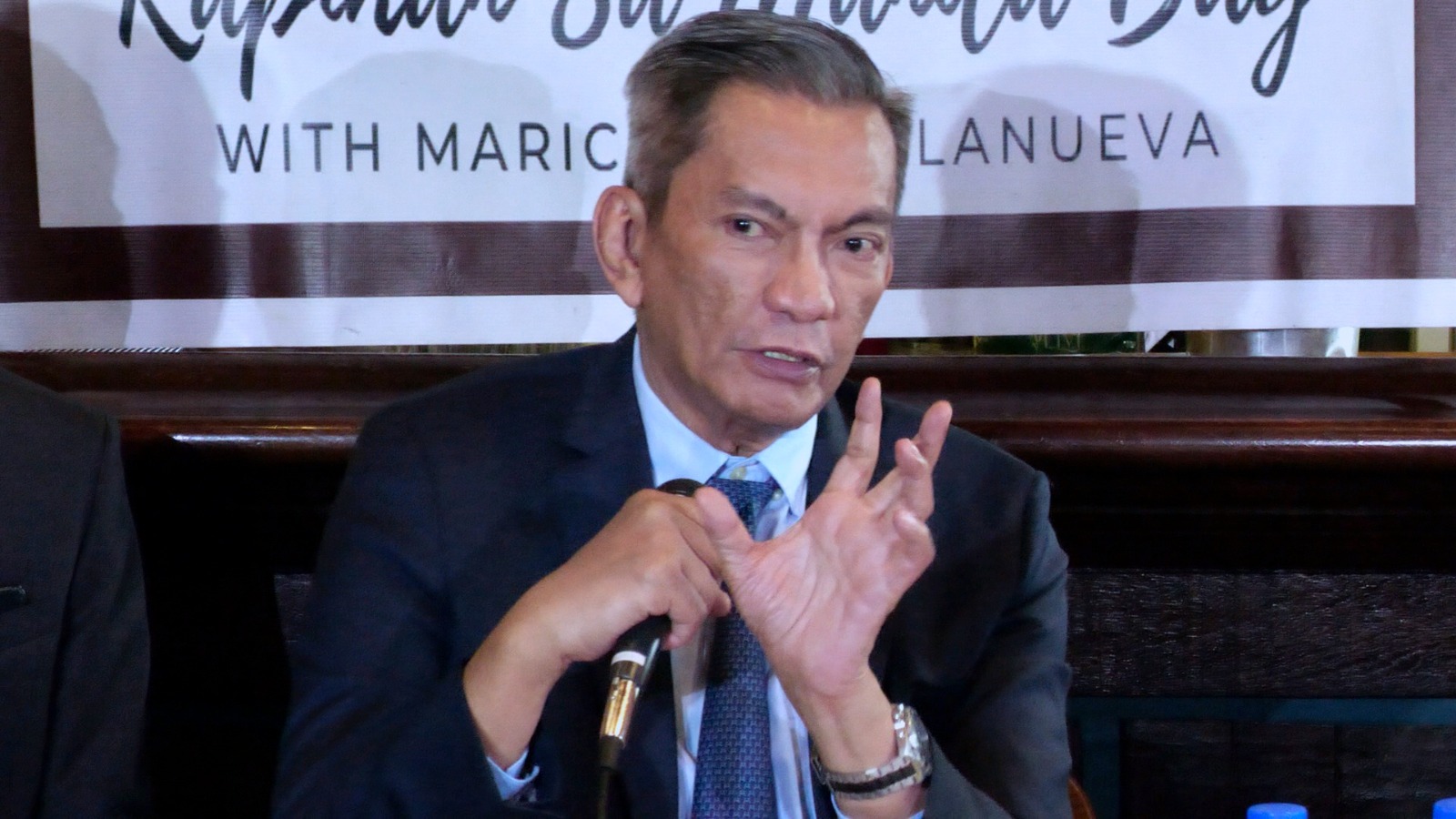
Albay 2nd District Rep. Joey Salceda at Kapihan sa Manila Bay. INQUIRER PHOTO
MANILA, Philippines — The new Bulacan Ecozone Law would provide the country a chance to do urban planning correctly, according to Albay 2nd District Rep. Joey Salceda, noting that the current systems have resulted in congestion within Metro Manila.
Salceda on Friday said that the creation of the Bulacan Ecozone will be a big boost to the country’s economy, as industries can be built near it.
Republic Act No. 11999 or the Bulacan Special Economic Zone and Freeport Act lapsed into law on June 13, after President Ferdinand Marcos Jr. neither signed it into law nor vetoed it.
“The Bulacan Ecozone is our chance to get urban planning right. NAIA (Ninoy Aquino International Airport) was a mess. It should not be where it is. We did not build an industrial base around it, or even plan transport and logistics. As a result, it does not realize its industrial potential, and is a bane on the traffic and congestion situation in Manila,” Sacleda said in a statement.
“Bulacan Airport will be the biggest investment ever made in the Philippines. You have to surround it with a well-planned ecozone. You can build export industries around it, because airports are now the world’s fastest ports of entry for goods. Electronics exports thrive around airports. Imagine Mactan but on steroids,” he added.
According to Salceda, Marcos’ decision to allow the enactment of R.A. No. 11999 would eventually create “a gross export potential of USD 200 billion for Bulacan ecozone”, which will boost the country’s gross domestic product by at least P130 billion per year.
Aside from creating revenue inflow into the country, the Bulacan Ecozone, dubbed as the New Manila International Airport, intends to ease congestion at Naia, which has been the country’s main gateway for decades.
The planned aiport will have four runways, eight taxiways, and three passenger terminals with a yearly capacity of at least 100 million passengers.
ACT Teachers party-list Rep. France Castro however said R.A. No. 19999’s enactment is troubling because corporate interests are allegedly prioritized over environmental concerns.
“This ecozone project threatens to displace thousands of fisherfolk families and destroy vital marine ecosystems in Manila Bay […] While proponents claim economic benefits, the reality is that this project will likely lead to significant revenue losses for the government due to excessive tax incentives. These resources could be better used for social services and genuine economic development that benefits the majority,” Castro said.
“The lawmaker also highlighted the environmental risks associated with the project. “The reclamation and construction required for this ecozone will cause irreparable damage to Manila Bay’s delicate ecosystem. This not only harms biodiversity but also puts coastal communities at greater risk of flooding and storm surges,” she added.
Castro called on the Marcos administration to reconsider the law, as it will affect fisherfolks in Bulacan and west of Metro Manila.
“We call on the government to reconsider this misguided policy and instead focus on sustainable development that protects our environment and supports the livelihoods of local communities. The voices of affected fisherfolk and environmental advocates must be heard and heeded,” she said.
“We will not stand idly by as our natural resources are sacrificed for short-term gains. The fight to protect our environment and people’s livelihoods continues,” she added.
Several groups have protested the creation of the ecozone as the reclamation activities are believed to lead to water displacement — raising water levels in different parts adjacent to the airport.
READ: ‘Kalikasan’ writ sought to stop Bulacan airport
San Miguel Corporation, the conglomerate behind the construction of the airport, has vowed to address flooding concerns while the ecozone is being built.
READ: San Miguel, the P1.5-T conglomerate, moves to solve Bulacan, Pampanga flooding
One of President Marcos’ actions when he assumed office in June 2022 was to veto the Bulacan Airport City Ecozone bill, due to alleged substantial financial risks to the country, particularly about taxation.
READ: Bongbong Marcos vetoes bill on Bulacan Airport City ecozone
It was Salceda who filed a corrected version of the bill.
READ: Salceda: ‘Corrected version’ of Bulacan freeport bill to address Marcos’ concerns
“I thank the administration for allowing the enactment of the Bulacan Ecozone Law. Because he vetoed the first version, carried over from the 18th Congress, I filed a new version that cures the defects the President cited in his veto message,” he said.
“We went through several back-and-forth communication with the Executive Secretary, with the economic agencies, and even with environmental agencies concerned with flooding. Study after study was made. We worked with the whole Bulacan delegation on amendments. It was extensive work. I’m elated that the President saw the merit in the work done, and registered no opposition to this version,” he added.